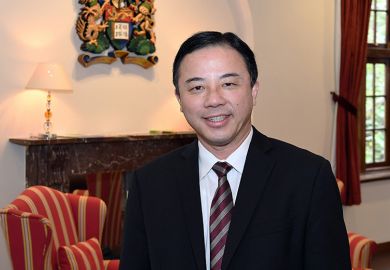Source: Kobal
Do v-cs mean business? Executive recruiting firm claims that the required skill set to lead a university has broadened
A firm of headhunters has questioned whether academics “are the right leaders of tomorrow” for universities, suggesting higher education leaders may need skills “most effectively honed in the business world”.
In a paper titled “21st century academic leadership: from the lecture hall or the boardroom?”, executive recruiter Odgers Berndtson asks whether a “new kind of leadership” is needed to respond to trends such as the globalisation of higher education, government funding cuts and the growth of online learning.
“Are the academics who have traditionally led universities the right leaders of tomorrow? Hasn’t the required skillset broadened?” the paper, which the firm plans to publish online, asks.
It continues that although “there’s no reason academics can’t be just as entrepreneurial…as those running FTSE 100 companies”, university leaders “increasingly need a wider range of skills that are often most effectively (albeit not exclusively) honed in the business world”.
It adds: “Many of the challenges facing universities are the same as those facing the commercial world – greater competition for talent and customers, intensified by operating in a global marketplace with fast-moving technology – so it makes sense that leadership forged in business should translate into a university context.”
In the US, the proportion of university presidents coming directly from a post outside higher education rose from 17 to 23 per cent between 2007 and 2012, the paper says. In the UK, 40 per cent of university leaders have “spent significant time” outside academia, it adds.
Odgers Berndtson concludes: “The universities of the future might be led by a world-class academic, a high-flying business executive, or a combination of the two. There is no single right answer – but those who stand still now risk finding themselves moving backwards before long.”
Stephen Crookbain, partner and head of the education practice at Odgers Berndtson, said there was “most certainly a connection between what we’ve found through this research and the rise in levels of remuneration [for university leaders]”.
But Amanda Goodall, author of Socrates in the Boardroom: Why Research Universities should be Led by Top Scholars, warned that universities would “absolutely go down the toilet” if they were led by business figures.
Dr Goodall, a senior lecturer in management at the Cass Business School, highlighted the contribution of Californian universities Stanford and Berkeley to technological development in Silicon Valley. These universities are “led by absolutely outstanding scholars who could hire other outstanding scholars who could create these spillover effects [for the US economy]”, she said.
There was “no way in hell Stanford University would ever have a businessman run it”, she added.
Dr Goodall also pointed out that “a lot of data and evidence” on researcher and university performance had gone into her argument that leading academics make the best leaders. To be a good leader “you have to understand the psychology behind your core workers, you have to know what motivates them”, whereas business leaders moving to universities tended to introduce “managerial systems” to try to “control” academics whose work they did not understand, she said.
Register to continue
Why register?
- Registration is free and only takes a moment
- Once registered, you can read 3 articles a month
- Sign up for our newsletter
Subscribe
Or subscribe for unlimited access to:
- Unlimited access to news, views, insights & reviews
- Digital editions
- Digital access to THE’s university and college rankings analysis
Already registered or a current subscriber? Login





